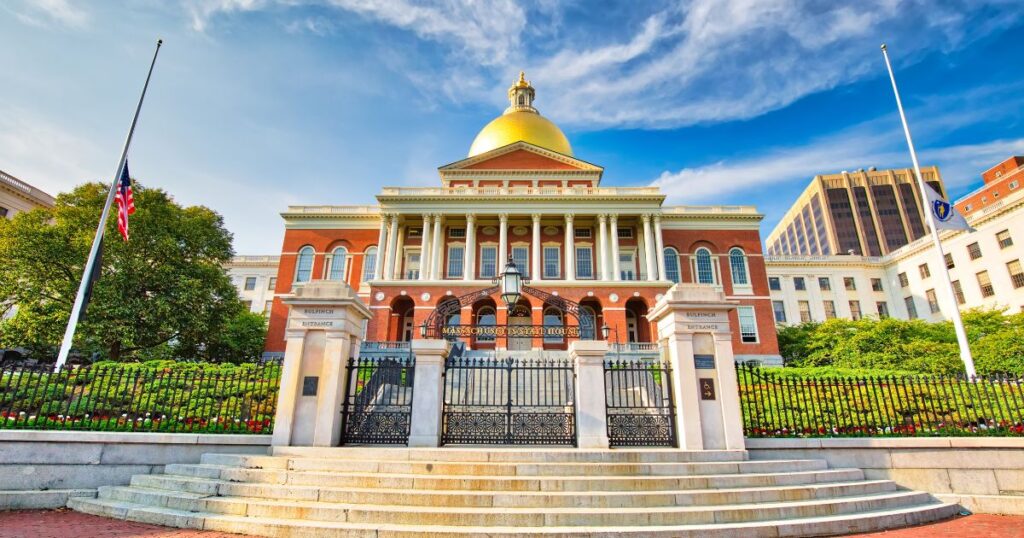Two controversial ballot initiatives filed this August could dramatically alter Massachusetts’ cannabis landscape, potentially eliminating the state’s thriving recreational marijuana industry while imposing strict new limitations on medical cannabis.
The initiatives, both titled “An Act to Restore A Sensible Marijuana Policy,” were filed by Caroline Cunningham and 14 other signatories.
While maintaining the legal possession of small amounts for personal use, these measures would effectively dismantle the entire commercial cannabis infrastructure that has generated millions in tax revenue and created thousands of jobs across the state, which was first reported by Boston.com
Proposed Changes to Massachusetts Cannabis Industry
The ballot proposals would fundamentally reshape Massachusetts cannabis law by repealing Chapters 94G and 64N of the General Laws, which currently govern recreational cannabis commerce and taxation.
Under these changes, adults 21 and older could still possess up to one ounce of marijuana without penalty, but the entire retail dispensary system would disappear.
The initiatives maintain that adults can transfer up to one ounce to other adults without compensation, provided the transfer isn’t advertised publicly.
However, possession of more than one ounce but less than two ounces would result in civil penalties of up to $100 and confiscation of the cannabis.
Perhaps most concerning for patients, Version A of the proposal would impose severe restrictions on medical marijuana, capping THC content at 30% for flower and 60% for concentrates.
Products with more than 5mg of THC per dose would be banned, along with any products lacking clearly metered 5mg servings. Version B maintains current medical marijuana regulations without these potency restrictions.
Both versions would eliminate the state’s 10.75% cannabis excise tax, which generated over $15 million in revenue in 2025 alone.

The Uphill Battle to the Ballot
Despite the attention these proposals have generated, their path to the 2026 ballot faces significant obstacles. Massachusetts’ initiative petition process requires multiple hurdles that few proposals successfully navigate.
First, the Attorney General’s office must certify the petitions by September 3, 2025, ensuring they meet constitutional requirements. If approved, supporters must collect at least 74,574 verified signatures from registered Massachusetts voters by November 19, 2025.
Even with sufficient signatures, the proposals would then go before the state legislature in January 2026. If lawmakers reject the measures before the first Wednesday in May 2026, supporters would need to gather an additional 12,429 signatures by June 17 to secure ballot placement.
Should the initiatives reach voters, they would require not only majority approval but also affirmative votes from at least 30% of all voters participating in the election. Which has historically proven challenging for many ballot measures.
Why Repealing Recreational Cannabis in Massachusetts Makes Little Sense
The economic data alone makes a compelling case against these proposals. Massachusetts’ legal cannabis industry has become a significant economic driver, generating substantial tax revenue that funds essential state programs and regulatory oversight.
Eliminating this revenue stream would create budget shortfalls while pushing consumers back to illicit markets.
Public safety considerations also weigh heavily against repeal. Legal cannabis markets provide regulated products with mandatory testing for pesticides, heavy metals, and other contaminants.
Dismantling this system would force consumers to rely on unregulated sources, potentially exposing them to dangerous substances and supporting criminal enterprises.
The proposals would also create a confusing legal environment where possession remains legal but no legal means of purchase exists. This contradictory framework would likely increase law enforcement burdens while providing no clear benefits to public health or safety.
Employment impacts cannot be ignored either. Massachusetts’ cannabis industry has created thousands of jobs across cultivation, manufacturing, testing, retail, and support services.
These positions offer career opportunities in communities that have historically been excluded from emerging industries, particularly through social equity programs designed to address past prohibition harms.
Medical Cannabis Restrictions Raise Serious Concerns
Version A’s proposed medical cannabis restrictions demonstrate a fundamental misunderstanding of patient needs and modern cannabis medicine. The 30% THC cap on flower and 60% limit on concentrates could eliminate many products that provide relief for patients with severe conditions.
Cancer patients undergoing chemotherapy, individuals with epilepsy, and those managing chronic pain sometimes require higher-potency products to achieve therapeutic effects. The proposed 5mg THC limit per serving ignores the reality that many patients requiring larger doses, and that dosing needs vary significantly based on individual conditions and body chemistry.
These restrictions would force patients to consume larger quantities of lower-potency products to achieve the same therapeutic benefit, potentially increasing costs and consumption while providing no additional safety benefits. Medical professionals, not ballot initiatives, should determine appropriate dosing and potency levels for their patients.
Limited Public Support and Political Reality
Polling data suggests these proposals face an uphill battle with Massachusetts voters. An April 2024 MassINC Polling Group survey found that 65% of state residents thought legalizing recreational marijuana was a good decision, indicating strong public backing for the current system.
The timing also works against the proposals, as they emerge during a period of increased scrutiny of the Cannabis Control Commission rather than widespread dissatisfaction with legalization itself.
Recent audit findings of regulatory mismanagement reflect administrative challenges, not fundamental problems with legalization policy.
Massachusetts voters have consistently supported progressive cannabis policies, from decriminalizing possession in 2008 to approving medical marijuana in 2012 and recreational legalization in 2016. This track record suggests limited appetite for rolling back established rights and economic benefits.
A Misguided Approach to Cannabis Policy
Rather than addressing legitimate concerns about cannabis regulation through targeted reforms, these ballot proposals would throw out years of policy development and economic progress.
The current system isn’t perfect, but dismantling it entirely would create more problems than it solves. Regulatory improvements, better oversight, and continued refinement of existing laws offer more sensible approaches to addressing any shortcomings in the current framework.
Massachusetts voters deserve cannabis policies based on evidence, public health research, and economic data rather than ideological opposition to legalization.
These ballot proposals if were to pass would be a significant step backward that would harm patients, eliminate jobs, reduce tax revenue, and strengthen illicit markets.
The state’s cannabis industry has matured considerably since legalization, with improved testing standards, product quality, and consumer education.
Abandoning this progress for a return to prohibition-era policies makes little sense given the documented benefits of regulated cannabis markets.

















